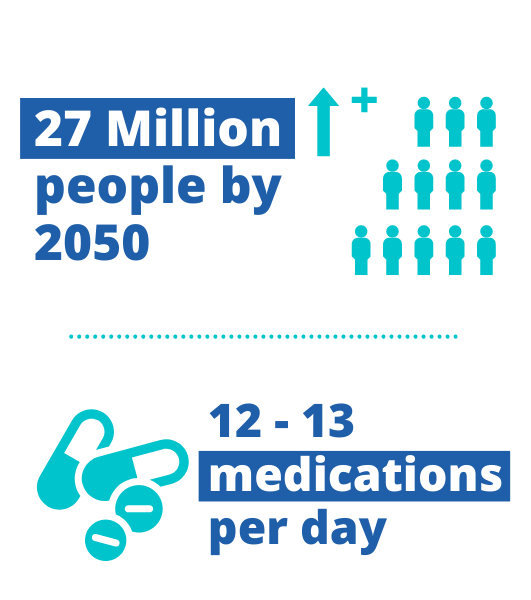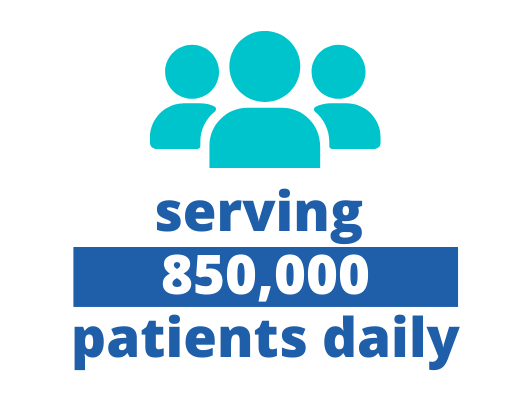Long-Term Care Pharmacies
The Important Role of LTC Pharmacies
LTC pharmacies serve a unique and essential role in our health care system and communities, working alongside other providers to deliver high-quality, cost-effective, coordinated care to patients who require long-term care services.

National Overview
Click Your State Below to Learn More About LTC Across the Country
Telling The Patient Story
Every day, approximately 850,000 patients across the country benefit from the essential, expert care that SCPC’s LTC pharmacies provide. By coordinating pharmacy services for residents of skilled nursing facilities (SNFs), assisted living facilities (ALFs), and other long-term care settings — including at-home care — SCPC members work tirelessly to ensure that individuals with unique care needs receive the medication management, prescription drugs, patient care, or other specialized services that they need to maintain their health and quality of life, and prevent costly hospital readmissions.
By the Numbers
Individuals in long-term care settings are often seniors and younger adults with disabilities who require long-term services and supports (LTSS) in addition to ongoing health care. LTC pharmacies are especially equipped to serve this population through medication management, 24/7/365 availability and in coordination with the patient’s health care team.
In the coming years, need for LTC pharmacies will continue to rise, as America’s long-term care population is expected to grow to 27 million people by 2050.
>The typical LTC patient needs approximately 12 to 13 prescription medications per day to manage their health.
>60% of LTC patients are 65 years or older and need help with everyday activities.
>14 million Americans nationwide require LTSS due to physical or cognitive disabilities or impairments that require care, which can include a combination of many different prescription medications each day to manage their health.
>A majority of LTC patients live in communal settings among other patients who may require different care and services provided by multiple caregivers.

Patient LTC Settings Overview
LTC pharmacies provide care to more than 2 million Americans who reside in various settings, including nursing homes, senior living communities, congregate care settings, and their own homes. Their patients rely on LTC pharmacies that have expertise in medically complex patient care beyond that of other pharmacies.
Care Across Locations
LTC pharmacies support the health and care needs of individuals across a wide range of settings — in long-term care facilities, and beyond. No matter where patients live, LTC pharmacies’ expert coordination of pharmacy services enable patients to best manage their health.
>Nursing Homes: Whether skilled nursing facilities (SNFs) or nursing facilities (NFs), LTC pharmacies support the licensed health professionals caring for the unique needs of their residents.
>Senior Living & Congregate Care Settings: LTC pharmacies provide care for people living in assisted living facilities, senior living communities, and congregate settings that do not need medical support, but still require medication to maintain quality of life.
>In-Home: As more people qualified for LTSS decide to stay at home, LTC pharmacies are expanding to deliver home- and community-based services.

Essential LTC Pharmacy Services
LTC pharmacies provide extensive services beyond typical medication dispensing. The life-saving patient care includes direct and ongoing care consultation with patients and their families, medication management, antibiotic stewardship and infection control, controlled substance monitoring, vaccination delivery and resident discharge services. LTC pharmacies also provide ongoing education and training for LTC staff and residents.
LTC Pharmacies vs. Retail
All pharmacies play a crucial role in our health care system by dispensing prescription medications to people when they need them. But LTC pharmacies don’t stop there. Their patient care extends far beyond filling prescriptions.
LTC pharmacies provide clinical services wherever their patients live – whether in long-term care facilities or at home. They actively manage medication therapy, serve on patient care and coordination teams, and engage directly with patients and their families at the bedside. LTC pharmacies also provide specialized services to increase adherence, reduce adverse reactions, avoid hospital admissions, and innovate new delivery methods and accessibility improvements to help improve people’s lives. They also offer advanced knowledge on medication management to patients and other members of a patient’s care team to promote healthier outcomes.
Importantly, LTC pharmacies also differ from retail pharmacies (like Walgreens or CVS) in their availability: LTC pharmacies operate 24 hours a day, every day of the year, to provide patient-focused and clinically oriented services whenever patient needs arise.
LTC Pharmacy at Home
For an increasing number of American families, in-home care is an appealing option for loved ones who need ongoing support. In fact, most Americans favor policies that will extend Medicare and Medicaid coverage to people living at home – and policymakers are responding. As the nation prepares for an even greater need for LTC and LTSS in the coming years, it also must grapple with the greater need for care where people prefer to live. Securing the continuum of care is vital for better health outcomes; providers and the care system must be nimble in shifting between home, community, facility, and hospital.
LTC pharmacies are a key collaborator in making long-term care at home possible for millions of Americans. Equipped to provide care across facility and home-care settings, LTC pharmacies can ensure patients receive the high-quality medication management and individualized care they deserve – helping to achieve better health outcomes wherever they live.

Advocacy by LTC Pharmacies to Drive Results
SCPC members represent 75% of America’s LTC pharmacy community. In order to provide high-quality care to 850,000 patients every day, SCPC advocates on behalf of its members. SCPC also connects its LTC pharmacy members with their Congressional representatives and key administration officials.

Resources
View Our Policy Priorities
Our year-round advocacy efforts consider the numerous, diverse settings in which LTC pharmacies operate, including skilled nursing facilities, assisted living facilities, hospice and rehabilitation facilities, among others, and the distinct, essential role LTC pharmacies play in our nation’s health care system.


